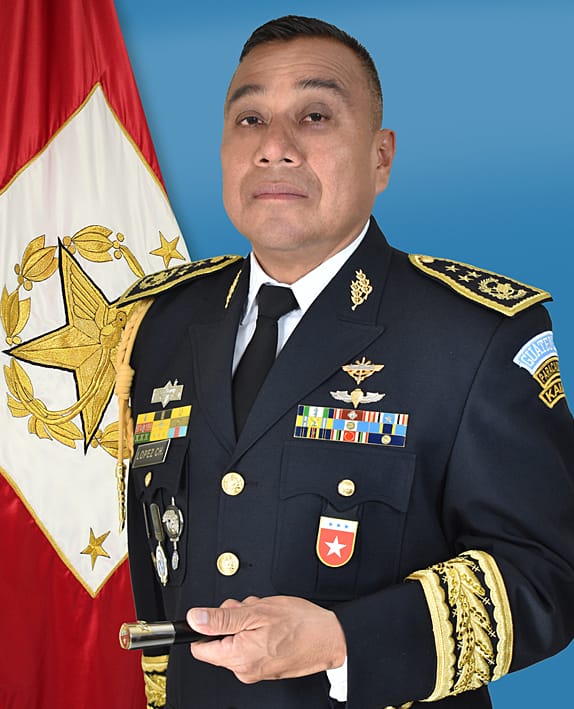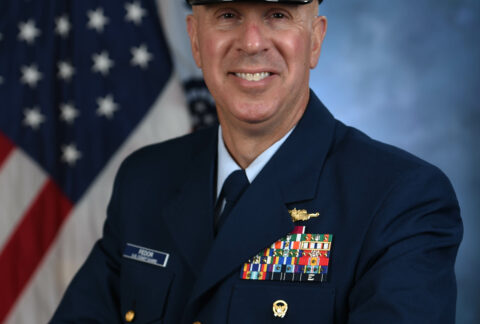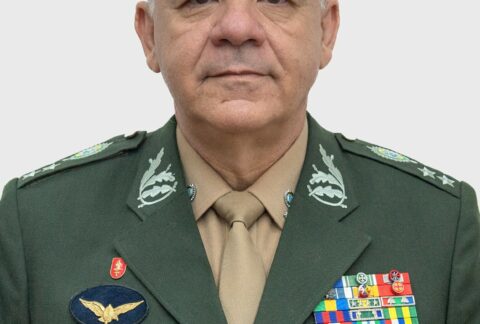Major General William Arnulfo López Chay, chief of the Guatemalan National Defense General Staff, has for main role to advise on the planning, execution, and evaluation of national mobilization within the framework of defense.
Maj. Gen. López spoke with Diálogo about the Guatemalan Armed Forces’ support for the country’s security.
Diálogo: How do the Guatemalan Armed Forces support the 2020-2024 National Security Plan?
Major General William Arnulfo López Chay, chief of the Guatemalan National Defense General Staff: The state of Guatemala has a national strategic security plan in which we are involved as an armed force. The Guatemalan Army contributes to the national effort that our Commander General and President of the Republic Alejandro Giammattei has with respect to combating threats, for which we work jointly with the Ministry of the Interior to support citizen security tasks and contribute to the perception of tranquility in the state.
Diálogo: The government of President Guammettei has given critical support to the Guatemalan Armed Forces. Why is that?
Maj. Gen. López: The president is our Army Commander General and he has provided all the support to the Guatemalan Armed Forces, both in terms of human resources and in capability recovery. Under his administration, air and land equipment and capabilities were acquired to combat transnational crime, so to speak, and to support the population, who trust us because the Armed Forces are always going to support the population in any disaster, since our slogan tells the citizens that “If you need a hand, the soldier has two to support the population.”
Diálogo: How does the Guatemalan Armed Forces support the cooperation program between the Ministry of the Interior and the U.S. Embassy’s Bureau of International Narcotics and Law Enforcement Affairs (INL) to combat narcotrafficking?
Maj. Gen. López: We maintain multiple efforts with the Ministry of Government and the Ministry of the Interior to counter threats to national security. We received training for human resources and means for our armed forces from the INL bureau, which have allowed us to combat the scourge of narcotrafficking. Unfortunately, Guatemala is a strategic step for transnational crime such as narcotrafficking, which affects our national security, and to this we add the fact that, regrettably, three types of illicit plantations have been found in the country: marijuana, poppy, and cocaine.
Diálogo: What is the function of the planning system known as Integrated Defense Planning and Management System (SIPLAGDE)?
Maj. Gen. López: SIPLAGDE is a complementary tool of the national defense policy that strengthens the transparency and accountability of the Guatemalan state.
Diálogo: Tell me about the collaboration efforts you are making with the countries of the Northern Triangle to combat the activities of organized crime.
Maj. Gen. López: We carry out tasks with Honduras and El Salvador focused on combating transnational crime that generates threats to national security, especially narcotrafficking and illegal migration. We also have the Central American Armed Forces Conference and the countries of the Triangle, with whom we carry out coordinated and combined operations. We also have meetings where we exchange information and conduct joint training for operations.
Diálogo: What are the capabilities of the two Bell 412EPX helicopters that the Guatemalan Air Force acquired in December 2022?
Maj. Gen. López: We use the Bell 412EPX helicopters especially for humanitarian aid operations because they are specialized for casualty transport. We’ve also used them to fight forest fires.
Diálogo: What kind of partnership exists between Guatemala and the Arkansas National Guard as part of the State Partnership Program?
Maj. Gen. López: The Arkansas National Guard has provided invaluable training to our personnel in different areas. It has also given us the means to combat and counter the multidimensional threats we face today.
Diálogo: What progress have you made in human rights?
Maj. Gen. López: The Guatemalan Army, today, is respectful of the human rights of the Guatemalan population, since we are framed by laws that regulate our actions.









